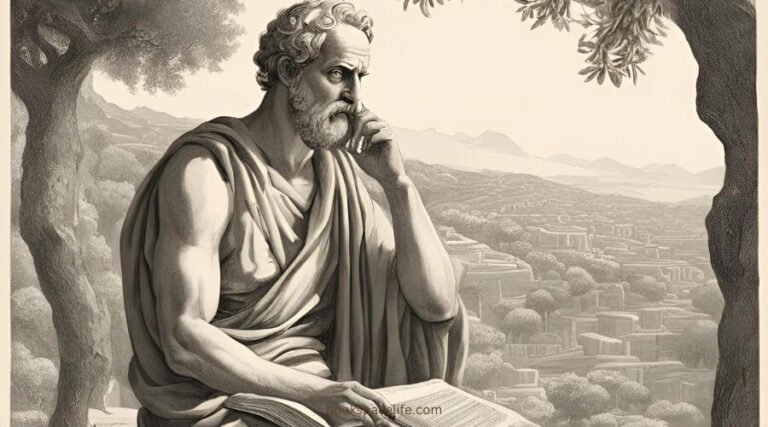Thales of Miletus
Democritus: The Philosopher of Atoms and Infinite Worlds
Democritus (460 – 370 BCE) is one of the most significant figures in the history of ancient Greek philosophy.
Often referred to as the “laughing philosopher,” Democritus is best known for his formulation of the atomic theory of the universe, which posited that everything is composed of indivisible particles called atoms.
His ideas laid the groundwork for later developments in science, especially in physics and chemistry.
This blog post explores Democritus’s life, early education, travels, philosophical contributions, and his lasting influence on both philosophy and science.
Quick Read
Table of Contents
(1) Early Life and Education
Democritus was born in Abdera, a city in Thrace, around 460 BCE.
His family was likely well-off, which provided him with opportunities for education and exploration.
The details of his early life are somewhat obscure, but it is believed that he received a broad education that encompassed philosophy, mathematics, and the natural sciences.
According to various ancient sources, Democritus studied under Leucippus, another pre-Socratic philosopher who is often credited with developing the initial ideas of atomism.
This relationship between teacher and student was significant, as it marked the beginning of Democritus’s lifelong commitment to understanding the nature of the universe through a rational and scientific lens.
Democritus’s education was not confined to Abdera. He is known to have traveled extensively, visiting regions such as Egypt and Persia.
These travels exposed him to various cultures and ideas, allowing him to incorporate a wide range of knowledge into his philosophical inquiries.
In Egypt, he reportedly studied mathematics and geometry, while his interactions with Persian thinkers further shaped his understanding of the natural world.

(2) Philosophical Contributions
Democritus’s philosophical contributions are primarily centered around his formulation of the atomic theory, which revolutionized the way people thought about matter and the universe. His philosophy can be summarized in several key ideas:
- Atomism: Democritus is most famous for his development of atomism, the theory that all matter is composed of tiny, indivisible particles called atoms. He proposed that these atoms vary in size, shape, and weight, and that they move through the void (empty space). This idea of an underlying structure to matter was revolutionary for its time and laid the groundwork for modern atomic theory.
Unlike earlier philosophers who sought to identify the fundamental elements of nature (such as water, air, or fire), Democritus asserted that the universe consists of countless atoms moving in a void.
He believed that the properties of matter result from the arrangement and interaction of these atoms, a concept that has endured in scientific thought through the centuries.
- Philosophy of the Void: Democritus’s assertion that the void exists is significant in his atomic theory. He argued that for atoms to move and interact, there must be empty space for them to occupy. This notion of the void was controversial, as many philosophers, including Aristotle, rejected the idea of empty space.
By embracing the concept of the void, Democritus challenged prevailing notions of continuity and the nature of reality.
His willingness to entertain such radical ideas illustrates his commitment to a scientific approach, prioritizing reason and observation over established beliefs.
- Ethics and Happiness: In addition to his scientific inquiries, Democritus wrote extensively on ethics. He believed that the ultimate goal of human life is to achieve happiness, which he defined as a state of inner peace and contentment. He argued that this happiness is attainable through moderation, self-control, and the pursuit of knowledge.
Democritus emphasized the importance of a well-balanced life, advocating for a philosophy that promotes rational thought, ethical behavior, and personal well-being.
His ethical teachings focused on the cultivation of virtue and the avoidance of excess, which he believed led to suffering and unhappiness.
- The Nature of Reality: Democritus’s philosophy extended to the nature of reality itself. He posited that the world we perceive is a result of the arrangement of atoms and that our senses can be deceiving. This idea foreshadowed later philosophical discussions about perception and reality, particularly in the works of philosophers such as Plato and Descartes.
By challenging the reliability of sensory perception, Democritus paved the way for a more empirical approach to understanding the world. He argued that true knowledge comes from rational thought and understanding the underlying principles of the universe rather than relying solely on empirical observations.
- Infinite Worlds: One of Democritus’s more intriguing ideas was his belief in the existence of infinite worlds. He theorized that there are countless worlds, each formed by different combinations of atoms. This notion of multiple worlds was revolutionary and anticipated later cosmological theories about the vastness of the universe.
Democritus’s ideas about infinite worlds raised questions about the uniqueness of our own world and the nature of existence.
His vision of a universe populated by countless atomic combinations opened up new avenues for scientific exploration and speculation about the nature of life beyond our planet.
(3) Influence and Impact
Democritus’s ideas have had a profound and lasting impact on both philosophy and science. His contributions to atomism and his empirical approach to understanding reality laid the groundwork for several important developments:
- Influence on Later Philosophers: Democritus’s ideas significantly influenced subsequent philosophers, including Epicurus and Lucretius, who expanded upon his atomic theory. Epicurus embraced atomism as a foundation for his own philosophical system, which emphasized the pursuit of happiness and the importance of pleasure.
Lucretius, in his poem “De Rerum Natura” (On the Nature of Things), articulated and popularized Democritus’s ideas about atoms, the void, and the nature of existence.
This work served as a vital bridge between ancient atomism and modern scientific thought, showcasing the enduring relevance of Democritus’s insights.
- Impact on Science: Democritus’s atomic theory laid the groundwork for the development of modern science, particularly in the fields of chemistry and physics. His conceptualization of matter as composed of indivisible particles resonates with contemporary atomic theory, which recognizes atoms as the fundamental building blocks of matter.
The scientific method, which emphasizes observation, experimentation, and rational inquiry, reflects the principles that Democritus championed.
His commitment to empirical observation and logical reasoning helped to shape the trajectory of scientific inquiry in the centuries that followed.
- Challenging Traditional Views: Democritus’s ideas challenged established beliefs about the nature of reality, pushing the boundaries of philosophical inquiry. His rejection of sensory perception as the sole source of knowledge encouraged later thinkers to explore the relationship between perception, reality, and knowledge.
This challenge to traditional views influenced the development of epistemology, the study of knowledge, and paved the way for later philosophical discussions about skepticism and the nature of truth.
Philosophers such as Descartes and Kant grappled with the implications of Democritus’s ideas in their own works, further enriching the philosophical discourse.
- Ethical Philosophy: Democritus’s focus on ethics and the pursuit of happiness contributed to the development of ethical thought in ancient Greece. His teachings on moderation, self-control, and the cultivation of virtue influenced later ethical theories, including Stoicism and Epicureanism.
The idea that happiness is achievable through rational thought and ethical behavior resonates with contemporary discussions about well-being and the nature of a good life.
Democritus’s ethical philosophy encourages individuals to seek fulfillment through meaningful actions and virtuous living.
- Cultural Impact: Democritus’s reputation as the “laughing philosopher” reflects his emphasis on joy and happiness, which has resonated throughout history. His belief that laughter and a light-hearted approach to life can lead to a more fulfilling existence continues to inspire individuals seeking happiness and contentment.
His philosophical legacy is evident in literature, art, and popular culture, where themes of laughter, joy, and the pursuit of knowledge endure.
Democritus’s ideas about the nature of reality and the importance of rational inquiry have become integral to our understanding of the world and our place within it.

(4) Conclusion
Democritus of Abdera stands as a monumental figure in the history of philosophy, whose ideas about atomism, ethics, and the nature of reality have had a profound and lasting impact on both philosophical and scientific thought.
His formulation of the atomic theory revolutionized our understanding of matter and laid the groundwork for modern science, while his ethical teachings continue to resonate with contemporary discussions about happiness and the good life.
As a pioneer of rational inquiry, Democritus encouraged individuals to seek knowledge through observation and reason, challenging traditional beliefs and opening new avenues for exploration.
His life and work serve as a testament to the enduring power of philosophy to foster critical thinking, inspire curiosity, and promote a deeper understanding of the universe and our place within it.
(A) 7 Quick Facts on Democritus
- Born in Abdera – Democritus was born around 460 BCE in Abdera, a city in Thrace, Greece.
- Studied with Leucippus – He is often associated with Leucippus, who proposed early atomic theories, influencing Democritus’s thought.
- Traveled to Egypt and Persia – Democritus traveled extensively to Egypt and Persia, seeking knowledge in mathematics and philosophy.
- Developed Atomic Theory – He is best known for formulating the atomic theory, positing that all matter consists of indivisible atoms.
- Believed in Infinite Universes – Democritus theorized the existence of infinite worlds, each composed of atoms.
- Emphasized Empirical Observation – He advocated for understanding nature through observation and reason rather than mythology.
- Wrote Numerous Works – Although most of his writings are lost, Democritus authored about 70 texts on various subjects, including ethics and physics.
(B) 10 Quotes attributed to Democritus
- Everything is made of atoms, which are indivisible. Proposing the fundamental nature of matter as composed of small, indivisible particles.
- Happiness resides not in possessions, and not in gold, happiness dwells in the soul. Emphasizing that true happiness comes from within, not material wealth.
- It is better to be unhappy than to be ignorant. Valuing knowledge and awareness over blissful ignorance.
- Time is a thing that is, and we cannot perceive it directly. Acknowledging the elusive nature of time in human experience.
- By convention sweet is sweet, bitter is bitter; by convention hot is hot, cold is cold; but in reality, there are atoms and the void. Distinguishing between subjective experience and objective reality.
- If we could but give up our desire for what is not, we would be free. Suggesting that freedom comes from letting go of unattainable desires.
- The man who is happy is not a man who has everything; he is a man who appreciates everything. Highlighting gratitude as a key component of happiness.
- The universe is a series of random collisions. Describing a materialistic view of existence based on chance interactions.
- Fear is the mother of morality. Proposing that fear of consequences shapes ethical behavior.
- We are not made of the same stuff as our thoughts. Reflecting on the distinction between material existence and consciousness.








